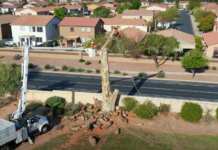Since July 1, 2004, sworn deputies from the Pinal County Sheriff’s Office (PCSO) have safeguarded the residents of Maricopa. Countywide, the PCSO has a total of 160 sworn deputies who are dedicated to protecting life and property, maintaining the peace, enforcing the law and safeguarding the constitutional rights of citizens. It’s important to know something about the duties of the men and women who provide law enforcement for this community.
According to the department’s mission statement, the PCSO “exists to serve the public with Integrity, Fairness and Professionalism that combines compassion and courtesy and thereby instills public trust in the PCSO.” Divided into four bureaus, the PCSO provides support services, patrol, criminal investigations and detention services.
Within the Patrol Bureau are four regions, including eastern, western, central and northern Pinal County as well as the Sheriff’s Posse, training, the Community Resource Unit and a Search and Rescue Unit. Seven sub-stations exist in Pinal County; they are located in Oracle, San Manuel, Apache Junction, Casa Grande, Florence, Arizona City and Maricopa.
Lieutenant Scott Elliott heads up the Maricopa sub-station. Maricopa’s boundaries are the edge of Rancho El Dorado where it meets Gila River Community lands on the north, east to Anderson Road, south to the Ak-Chin Community and west to Acacia Crossings or about a mile west of the dairy. Elliott currently has 12 deputies, two sergeants, two corporals, a detective and two secretaries under his supervision. Five deputies are doing field training. Two resource officers are assigned to Maricopa schools.

Lieutenant Scott Elliott is in charge of the Maricopa Sheriff’s Office substation.
According to the Sheriff’s office web site, a deputy earns between $38,952 and $53,825 annually. Prospective deputies must be 21 years of age, a U.S. citizen, have successfully completed an extensive background check, possess a high school diploma or GED and be a graduate of an accredited police academy. Candidates must also pass a written exam and a physical fitness evaluation.
Without prior experience, it will take a deputy eight months from his or her hiring date to go through all the required training. For those “laterals” with previous police work experience, the training program consists of two phases, each three weeks long.
Two deputies and a supervisor are on each shift. Shifts rotate every three months and are eight hours long. The busiest days for Maricopa deputies are Thursday through Saturday. Curfew for juveniles is 10 p.m. during the week and midnight on the weekends. Dodge and Chevy trucks are the most often stolen vehicles currently. The average response time for calls is two to five minutes.
An incredible amount of paperwork is involved in an arrest. The paperwork may take a deputy off the streets for up to three hours, and it must be completed rapidly and accurately. Certain documents must accompany arrested individuals when they are transported to Florence since the local sub-station is not a detention facility. Paperwork varies depending on the severity of the charge, but, for example, a DUI traffic accident involving a single vehicle can necessitate approximately 23 pages of information.

Maricopa’s office — where all the paperwork is completed.
The Pinal County Sheriff’s Posse, a volunteer group, assists deputies by providing transport for arrested individuals. Posse members work whenever they want to and receive no compensation except for personal satisfaction.
It is not mandatory that deputies wear bulletproof vests, but most do. The vest supplied by the county protects the wearer from handguns and stops knives; however, it does not protect against military rifles.
Deputies call in their location as well as the license number of a vehicle they pull over. That provides backup in case of a pursuit or other problems.

Every patrol vehicle has sophisticated radio equipment.
It takes 40 hours of training to become proficient in the use of a radar unit. Deputies must exhibit 100% accuracy in 20 tests in a moving patrol car and 20 tests in a stationary vehicle. They must be within five miles either way of guessing how fast a car is moving without utilizing the radar. If these tests are successfully completed, the deputy is then radar certified. Radar is the preferred method of speed enforcement and is more accurate than pacing a vehicle, which can be done if the deputy doesn’t have a radar unit.
Recently Sheriff Chris Vasquez issued soft restraints, which are made out of a spongy material that doesn’t leave marks or cause pain, to every squad of deputies in the county. These restraints are better suited than handcuffs for children, the mentally ill or even suicidal individuals.
Should you need to reach PCSO deputies, the (520) 568-2233 number is an 8 a.m. to 5 p.m. office number. To report non-emergency problems or suspicious activity, the 24/7 number is (520) 866-5111. Call 911 for a true emergency situation.
If you would like to know more about the job of a PCSO deputy, you can contact the local sub-station to arrange a ride-a-long with one of them. Ride-a-longs are limited to one every six months and are approved on an individual basis.

![Shred-A-Thon to take place tomorrow An image of shredded paper. [Pixabay]](https://www.inmaricopa.com/wp-content/uploads/2024/03/shredded-paper-168650_1280-218x150.jpg)












![Shred-A-Thon to take place tomorrow An image of shredded paper. [Pixabay]](https://www.inmaricopa.com/wp-content/uploads/2024/03/shredded-paper-168650_1280-100x70.jpg)


